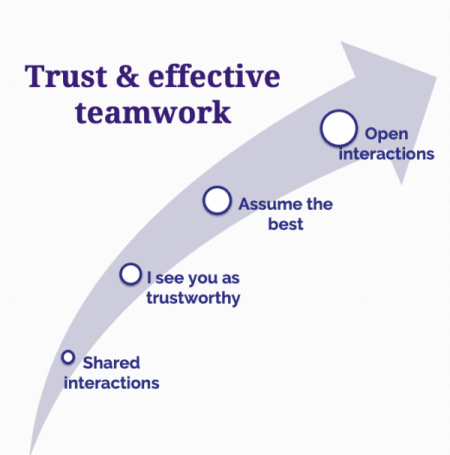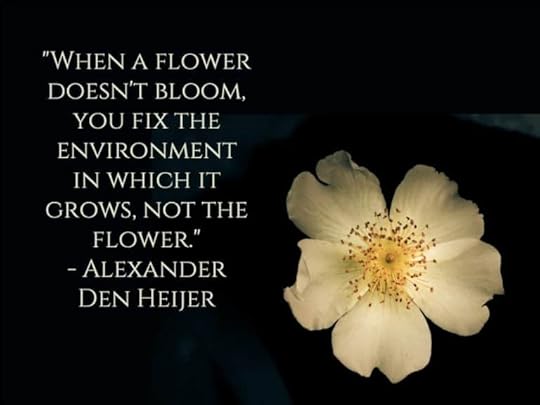Tina Hallis's Blog, page 7
April 24, 2022
What’s the most powerful positivity practice?

I was winding up my program, Sharpening Your Positive Edge, when a fellow in the front raised his hand. He asked why I recommended remembering three good things at the end of the day instead of anticipating three good things in the morning.
I thanked him for his fantastic question and agreed that anticipating good things in the morning is also a great way to charge our positivity battery. I acknowledged that a one-hour program limits the number of practices I can mention. Then I said that I really appreciated his question because it brought up a very important point; one that was a huge learning for me. The most impactful and powerful intervention we can do to boost our positivity totally depends!
It depends on each person’s personality, what’s going on in their life at the moment, their lifestyle, etc. So in order to find the perfect strategy for you, the best option is to experiment. Consider a few possibilities that sound interesting and doable then give them a try for a week or two. Is it purposely adding in music, connecting more with friends, doing breathwork, adding in a different type of meditation or prayer, journaling, spending more time with pets, or enjoying a favorite hobby?
A few times I tried journaling about good things in my day at bedtime, but it never seemed to work for me. When my daughter was little, we would share good things when I tucked her in to bed. Then she became a teenager and now I go to bed before her. So we need to be flexible and adaptable. If a strategy doesn’t work or things change, our practices may need to change. And it’s often helpful to switch things up so we don’t get complacent or bored.
That’s why I write these weekly tips; to give you (and me) more ideas. That’s why my book has 80 short positivity tips. Some may get used over and over while others just don’t resonate. The goal is to build our internal resources so we have more capacity to be patient and curious and optimistic and to intercept our saboteurs.
Is it time to add to or change up your positivity practices? Browse my list with hundreds of weekly tips and find what works for you!
April 17, 2022
Five Situations Our Brains Use to Determine Trust

I received an email from a coworker from another department. They weren’t happy with how I was handling a situation with a customer. I was irritated, but I politely responded back about why I was doing what I was doing. The next email from them continued to challenge my actions AND they copied my boss. What? I was FURIOUS! That was uncalled for!
Isn’t it interesting how an action that challenges our judgment and expertise can trigger such a strong response? Now, in hindsight, I understand that my professional status had been threatened and my natural survival instincts had kicked in as if I was in actual physical danger. Watch out!
The SCARF ModelI recently presented a workshop on building trust in remote teams where we explored the neuroscience of how our brains decide if we should trust another person. Once we realize that our survival instinct sees trust as very risky business, it makes sense that we need opportunities to observe (and display) trustworthiness. We need shared experiences to decide if this other person is a threat or if they are safe. If we have enough context and experience to believe they are safe, our brain is more willing to assume the best about their intentions. Now we are more comfortable sharing our ideas, our feedback, our mistakes, and our questions.
The SCARF model, developed by David Rock of the Neuroleadership Institute, highlights five situations that our brains see as very important to determine if someone is safe or a threat.
S – Status – Does this person support and reinforce my social or professional standing?C – Certainty – Can I be confident about this person’s behavior and what I can expect from them?A – Autonomy – Does this person make me feel like I have control, influence, and choices?R – Relatedness – Do I feel a connection with this person and understand their ideas or values?F – Fairness – Does this person treat me and others in a fair and respectful manner?Consider how you support or undermine each of these factors with your team members, and see if you can identify which SCARF factors may be getting triggered when you feel a loss of trust.
April 8, 2022
What If Life Is Like a Movie Theater? Choose Your Show Carefully

Imagine that you’re at the local movie cinema. You’re in a dark room, munching on popcorn, enjoying Raya and the Last Dragon with your kids. But in the room next to yours, people are sitting on the edge of their seats, hearts pounding, as they watch The Amityville Horror. And yet, a little further down the hall, another set of people are watching the action-packed James Bond movie, No Time to Die.
All of these movies are happening at the same time (more or less), yet your experience during that time frame depends on which movie you choose to see.
What if we could think of life like a movie theater? There are a lot of different plots and stories happening all at the same time but we get to choose where we put our attention. Are you going to choose to go to a feel-good show? A thriller? A comedy?
Just to be clear, I’m not suggesting we should ignore the bad things in our world. But if that’s the main “show” we watch, we will spend our days feeling frustrated and upset. There are many good aspects of life we can tune into.
For example, I was recently on a Zoom call with hundreds of other PQ coaches from around the world for a monthly Q & A training session with Shirzad Chamine. After 90 minutes of hearing from so many people who are excited to help others and change the world for the better, I couldn’t help but feel optimistic about humanity. If I look for it, I can find many groups who are not only supporting others, but they’re also growing in size!
What “movies” do you spend the most time watching? Guard your time and mind carefully! They are precious resources! What you give your attention to determines the quality of your life.
This post was inspired by the author Michael Singer and his quote,
“It’s not about what life is doing; it’s about what you are doing with what life is doing.”
April 3, 2022
The Balance of Self-Leadership and Leaning on Others

Self-leadership has become a common buzzword. After all, who is more responsible for your attitude, your actions, and your motivation than you? So much of what I’ve learned and used in my own life has been based on the idea that we have the power to choose our thoughts to create the best outcomes for ourselves and others.
Yet, there can be times when self-leadership is not enough. Or maybe it’s just plain out of reach.
When I was at the World Happiness Summit a few weeks ago, I had the opportunity to listen to one of my amazing past teachers in Positive Psychology, Megan McDonough. She referred to the idea of self-leadership as “selfing.” While acknowledging its power, she also acknowledged that there are times when we’re just trying to endure life and selfing is just too hard.
I think of a friend who lost her son to fentanyl poisoning, or a new friend who is battling a life-threatening cancer diagnosis, or another friend who is overwhelmingly exasperated at the state of humanity and the world. Finding our way through these dark times can feel impossible. It can suck the life and energy from our souls.
Megan used the term “un-selfing” to emphasize the idea that at times we need to let go of our individual separateness; that sometimes we need outside help. This could be leaning on others or leaning on our spirituality, whatever that looks like for us.
A common trap is to withdraw and feel isolated in our misery. Instead of turning to friends, family, and/or the divine, we can be lured in by the escape of alcohol, comfort food, addictive shopping, and other unhealthy distractions that provide temporary relief. Or we can spiral downward into negative thinking that blocks our ability to see any of the good in our life.
Megan quoted William James:
“We are like islands in the sea – separate on the surface but connected in the deep.”
Do you need to shift from self-leadership to un-selfing right now? Have there been times in the recent past that un-selfing would have been a better choice? Do you know of someone in your life who needs to un-self and maybe you could help by offering to hold space for them?
March 27, 2022
A Life Too Busy to Live

A study done in the 1970s included 40 students from the Princeton Theological Seminary. They were asked to deliver a sermon on the parable of the Good Samaritan. They were told that they would walk across campus to another building where their sermon would be judged by their supervisors. Unbeknownst to the students, they were divided into three groups.
The first group was told, “You’re late. They were expecting you a few minutes ago. You’d better hurry.”The second group was told, “The assistant is ready for you. Please go right over.”The third group was told, “It’ll be a few minutes before they’re ready for you, but you might as well head over. If you have to wait, it shouldn’t be long.”In case you don’t remember, the story of the Good Samaritan is about a traveler who was robbed, beaten, and left half-dead by the side of the road. Two religious men passed the injured traveler and failed to notice him. But a third man, a Samaritan, who would be expected to despise the Jewish traveler, stopped and helped him. He felt empathy for the man despite their differences in beliefs or religion.
What happened with the three groups of seminary students in the study? In their journey across the campus, each student encountered an “injured traveler” who appeared destitute and sick, coughing while slouched over by the side of the road. In the highly rushed group 1, only 10% of the students stopped to help. In the intermediate rushed group 2, 45% stopped. And in the least rushed group 3, 63% stopped.
Why did so many of the rushed theology students fail to take the time to offer help? Were they more interested in their sermon than caring for others? Or is it that feeling rushed overshadowed their values, causing them to make choices incongruent with their beliefs?
Could our current busy lifestyles be overshadowing our ability to offer help? To be kind? And maybe our busyness is not only interfering with how we treat others, but also how we treat ourselves. How often do you feel too busy to take time to care for yourself? What choices have you made that have created this level of rushing?
Have you created a life that you’re too busy to live?
March 12, 2022
When Their Saboteur is Triggering Your Saboteur Try Empathy

The Daily Focus on my PQ app today was on using my empathize power to improve my relationships. In the day’s original message, Shirzad was telling us to bring empathy to our relationships as we consider how the other person’s saboteur is causing them damage. He points out that when other people’s saboteurs are in action, it naturally triggers our saboteurs, which then fuels their saboteur even more, creating a vicious cycle.
How can you use your sage’s empathize power to interrupt this cycle? For example, it may feel like the other person’s controller, stickler, or hyper-vigilant saboteur is being hard on you, but you can pause and consider how hard that saboteur is also being on them. And you can remember that they are living with this saboteur inside their head. Their demanding judge or hyper-achiever is likely a common brutal voice, constantly attacking them.
The notification from the PQ app’s Daily Focus reminds us how we can use this message in our busy life.
Think of a relationship you want to improve. Next, think of something about this person that bothers you the most. Remember that the behaviors that bug us tend to come from their saboteurs, and saboteurs are based in fear. Consider what fear might be behind this trait or behavior. Is it fear of rejection? Fear of failure? Fear of looking bad? Fear of poverty? Fear of being hurt? Empathize with how painful these kinds of feelings can be. Use it as a reason, not an excuse for their behavior.
Shifting into empathy can help us keep our saboteurs in check and not add fuel to the fire. It can make it much easier for us to choose a helpful response instead of reacting from our judge.
Do you know your top saboteurs? Take the free assessment by clicking here and then scrolling down to the saboteur area.
I LOVE having the Positive Intelligence (PQ) app on my phone! Every weekday I get a new Daily Focus and the app notifies me every few hours to take a couple of minutes to practice. I’m grateful for the in-depth training I’ve had with Shirzad Chamine. He is the founder and author of Positive Intelligence and the creator of the app. Let me know if you’re interested to learn more.
March 6, 2022
How Strong Is Your Community?

How strong is your community? No, I’m not talking about your neighborhood. I’m talking about the community of people with whom you can be yourself; where you share common values, interests, and goals. Where you feel like you belong.
So often, people can feel “different,” like an outsider, or even like something is wrong with them because they don’t fit in. This is extremely common in high school but can linger for many into adulthood. The people in our lives, in our work, in our family just don’t understand us.
I was reminded of this while reading a Facebook post from a person who I think is amazing, and I have the utmost respect for their brilliance. Yet, she was sharing how throughout her life, she wanted to be someone that everyone liked but felt she just couldn’t be herself. She felt like she persistently had to fight to prove that different is not always bad. The quote included in her touching and heartfelt story was –
“When a flower doesn’t bloom, you fix the environment in which it grows, not the flower.” Alexander Den Heijer
She has since found her tribe and is blossoming while fulfilling her purpose.
Another friend was recently sharing with me how she doesn’t connect with the people at her work and how she needs a community outside of work that shares her interests and passions.
How can you find your people? I was lucky to discover so many wonderful friends when I joined the National Speakers Association. Other networking groups for entrepreneurs proved to be great places for connecting, too. Then, as people got to know me, they would connect me with other people that they thought I should meet. Even the pandemic seemed to make it easier for me to connect to people via video meetings.
Here’s my advice, and this is coming from an introvert. Make sure your friends and family know the areas and topics that interest you. You never know who they know or might meet. Talk about your favorite topics on social media. Look for social media groups related to that interest. Look for associations, networks, and meetings that focus on them. See if you can get involved or attend a conference. Offer to help.
Feeling isolated, different, or misunderstood drains our energy, our happiness, and hurts our overall wellbeing. Finding a community of people that “get” you can help you bloom.
February 27, 2022
Keeping the Home Fires Burning with Love and Gratitude

The other day my husband asked if he should put more wood on the fire before he came to bed. I felt a quick little spike of annoyance. I reminded him that we had talked about this earlier. It was going to be warm the next day so we were going to let the fire in our wood-burning stove go out. Then we could empty out the ash later the next day.
“Then why did you want me to bring more wood in earlier this afternoon?” he asked.
“Because I thought it would still be nice to have a fire in the evening. Then we could let the fire go out for the night.” I responded.
This probably sounds like a boring conversation on the surface, but I wonder if you can relate to the underlying feelings. Were we both feeling calm and this was just a side-conversation without emotion? Or did we both feel annoyed and misunderstood? What thoughts and tone of voice accompanied this interaction?
One of my top saboteurs is Hyper-achiever. (Learn your saboteurs here.) I like to get things done, and I like to be right. I can also get impatient when it feels like people aren’t listening, and I have to repeat myself.
It felt like a challenge when my husband questioned me about why I wanted him to bring in more wood if we were going to let the fire go out. Was his saboteur getting triggered by my saboteur that showed impatience? Or was it just an innocent question that I was misinterpreting?
In my not-so-distant past, I would have let my saboteur choose my words and my tone. “You weren’t listening to me! I already told you . . . !”
This time I took a breath. I noticed my reaction and the words forming in my mind. I was able to think, ‘Thank you, Hyper-achiever, but I don’t need your “help” this time.’
“Thanks so much for bringing in that wood earlier. I really enjoyed the fire we had this evening.” I said with love and gratitude.
What simple, everyday situations could you use as opportunities to practice overriding your saboteurs? Even reflecting on what you could have said instead can make you better prepared for next time.
February 20, 2022
The Skill of Asking for Help

Last night, I had the opportunity to attend an event called Project BRAVE. There was great music, engaging storytellers, and insightful speakers. But what made this event a little different than the ones I normally attend, is that the focus of the songs and stories was on mental health and substance abuse.
A mom shared losing her 18-year-old son to fentanyl poisoning and her determination to create awareness for this pandemic.
A nurse shared being bullied by her organization on top of struggling as she was assigned to be on the frontlines of Covid testing.
A teacher shared breaking down into tears in front of a screen full of black boxes where there once was a classroom full of real faces.
There were stories about depression, anxiety, stress, and suicide.
But the overarching message was one of hope, and of the incredible power of asking for help.
How easy is it for you to ask for help? As a society, it can feel like we’re taught that needing help is a sign of weakness; that admitting we aren’t perfect is a major flaw. Yet, the people close to us will feel more connected and relate to us more easily when we can talk about our challenges. And asking for help gives them permission and encouragement to do the same.
Brené Brown says, “Vulnerability sounds like truth and feels like courage. Truth and courage aren’t always comfortable, but they’re never weakness.”
On the flip side; do the people in your life feel comfortable admitting their imperfections and troubles to you? Do they feel safe being vulnerable and asking you for help? Letting these people know that you’re there for them without judgment, no matter what, can make a huge difference.
This week, who can you ask for help? Even if it’s something small. Build the skill by practicing. Whether it’s friends, family, a mentor, or a counselor. By doing so, you help others see that it’s not a weakness, but instead, that we are better together.
“We don’t have to do all of it alone. We were never meant to.” – Brené Brown
February 13, 2022
A Great Valentine’s Gift – How You Respond to Their Good News

Have you ever been excited to share some good news with your partner, kid, or friend, but you only received a lukewarm response before they turned the conversation to their own “stuff?” How did you feel? I’m betting it was not only disappointing, but you probably felt less connected to the other person.
Studies show that the health of a relationship is very dependent on how each person responds to the other’s good news. In fact, it’s even more important than when they share something bad. I understand how important it is to support the other person when they’re upset, but do I also make it a point to join in with my friend’s or husband’s excitement? (Especially if I’m not in a very good mood?)
Prof. Shelly Gable at the University of California-Santa Barbara has studied close relationships for years. She’s found that out of four possible ways to respond to someone’s positive news, only one—an “active constructive response”—is good. A negative or semi-positive reaction can undermine trust and connection.
Let’s say a friend calls and shares how excited they are about their upcoming trip. Here’s how NOT to respond.
Active destructive – Frown. “Do you think that’s a good idea? It sounds expensive, and you’re going to miss a lot of work. And you will miss seeing your (kid/grandkid/dog/cat).Passive destructive – No expression. “Today, I had this annoying customer I had to deal with. They . . . (bla bla bla).”Passive constructive – Smile. “That’s great. By the way, are we still getting together for lunch next week? I want to make sure I put it on my calendar.”Here is how to build connection, trust, and positive wellbeing for both sides.
Active constructive – Smile. Stop what you’re doing. Make eye contact. “How exciting! I’m so happy for you! Tell me more.”Showing genuine interest and asking questions build on the positive moment and can create an upward spiral. This is true not only for our close relationships but also with our kids and even in our businesses. It can be hard if we’re struggling with our own stress or frustrations, but it’s worth the effort.
This Valentine’s Day, consider how you can provide the gift of boosting someone’s good news by joining in with them to celebrate.



